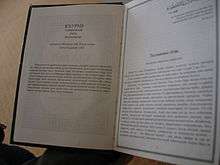Karachay-Balkar language
| Karachay-Balkar | |
|---|---|
|
Къарачай-Малкъар тил Таулу тил | |
| Native to | Russia |
| Region | Kabardino-Balkaria, Karachay–Cherkessia, Afyonkarahisar Province |
| Ethnicity | Karachays, Balkars |
Native speakers | 310,000 (2010 census)[1] |
| Dialects |
|
|
Cyrillic, Latin | |
| Official status | |
Official language in | |
| Language codes | |
| ISO 639-2 |
krc |
| ISO 639-3 |
krc |
| Glottolog |
kara1465[2] |

Koran Karachay-Balkar language version
The Karachay-Balkar language or Karachay-Balkar Turkish[3] (Къарачай-Малкъар тил, Qaraçay-Malqar til or Таулу тил, Tawlu til) is a Turkic language spoken by the Karachays and Balkars. It is divided into two dialects: Karachay-Baksan-Chegem, which pronounces two phonemes as /tʃ/ and /dʒ/, and Balkar, which pronounces the corresponding phonemes as /ts/ and /z/. The modern Karachay-Balkar written language is based on the Karachay-Baksan-Chegem dialect. The language is closely related to Kumyk.[4]
Alphabet
Modern Karachay-Balkar Cyrillic alphabet:
| А а | Б б | В в | Г г | Гъ гъ | Д д | Дж дж | Е е |
| Ё ё | Ж ж | З з | И и | Й й | К к | Къ къ | Л л |
| М м | Н н | Нг нг | О о | П п | Р р | С с | Т т |
| У у | Ў ў | Ф ф | Х х | Ц ц | Ч ч | Ш ш | Щ щ |
| ъ | Ы ы | ь | Э э | Ю ю | Я я |
Modern Karachay-Balkar roman alphabet:
| A a | B в | C c | Ç ç | D d | E e | F f | G g |
| Ƣ ƣ | I i | J j | K k | Q q | L l | M m | N n |
| N̡ n̡ | O o | Ө ө | P p | R r | S s | Ş ş | T t |
| Ь ь | U u | V v | Y y | X x | Z z | Ƶ ƶ |
Language example
Article 1 of the Universal Declaration of Human Rights in Karachay-Balkar:
| In Cyrillic | Transliteration | Translation |
| Бютеу адамла эркин болуб эмда сыйлары бла хакълары тенг болуб тууадыла. Алагъа акъыл бла намыс берилгенди эмда бир-бирлерине къарнашлыкъ халда къараргъа керекдиле. | Bütew adamla erkin bolub emda sıyları bla haqları teñ bolub tuwadıla. Alağa aqıl bla namıs berilgendi emda bir-birlerine qarnaşlıq halda qararğa kerekdile. | All human beings are born free and equal in dignity and rights. They are endowed with reason and conscience and should act towards one another in a spirit of brotherhood. |
Numbers in Karachay-Balkar and Turkish
| 0 | 1 | 2 | 3 | 4 | 5 | 6 | 7 | 8 | 9 | 10 |
| сыфар (sıfar) | бир (bir) | эки (eki) | юч (üç) | тёрт (tört) | беш (beş) | алты (altı) | джети (ceti) | сегиз (segiz) | тогъуз (toğuz) | он (on) |
| sıfır | bir | iki | üç | dört | beş | altı | yeti | sekiz | dokuz | on |
Loanwords
Loanwords from Ossetian, Kabardian, Arabic, and Persian are fairly numerous.[4]
Bibliography
- Chodiyor Doniyorov and Saodat Doniyorova. Parlons Karatchay-Balkar. Paris: Harmattan, 2005. ISBN 2-7475-9577-3.
References
- ↑ Row 102 in Приложение 6: Население Российской Федерации по владению языками [Appendix 6: Population of the Russian Federation by languages used] (XLS) (in Russian). Федеральная служба государственной статистики [Federal State Statistics Service].
- ↑ Hammarström, Harald; Forkel, Robert; Haspelmath, Martin; Bank, Sebastian, eds. (2016). "Karachay-Balkar". Glottolog 2.7. Jena: Max Planck Institute for the Science of Human History.
- ↑ "Course Information: Karachay-Balkar Turkish". Sakarya University.
- 1 2 George L. Campbell and Gareth King (2013). Compendium of the World Languages. Routledge. ISBN 978-1-1362-5846-6. Retrieved 23 May 2014.
External links
| Karachay-Balkar edition of Wikipedia, the free encyclopedia |
| Wikivoyage has a travel guide for Karachay-Balkar phrasebook. |
- Russian-Karachay-Balkar On-Line Dictionary (a)
- Russian-Karachay-Balkar On-Line Dictionary (b)
- "Заман" newspaper
- "Къарачай" newspaper
- "Минги Тау" magazine
This article is issued from Wikipedia - version of the 11/13/2016. The text is available under the Creative Commons Attribution/Share Alike but additional terms may apply for the media files.
